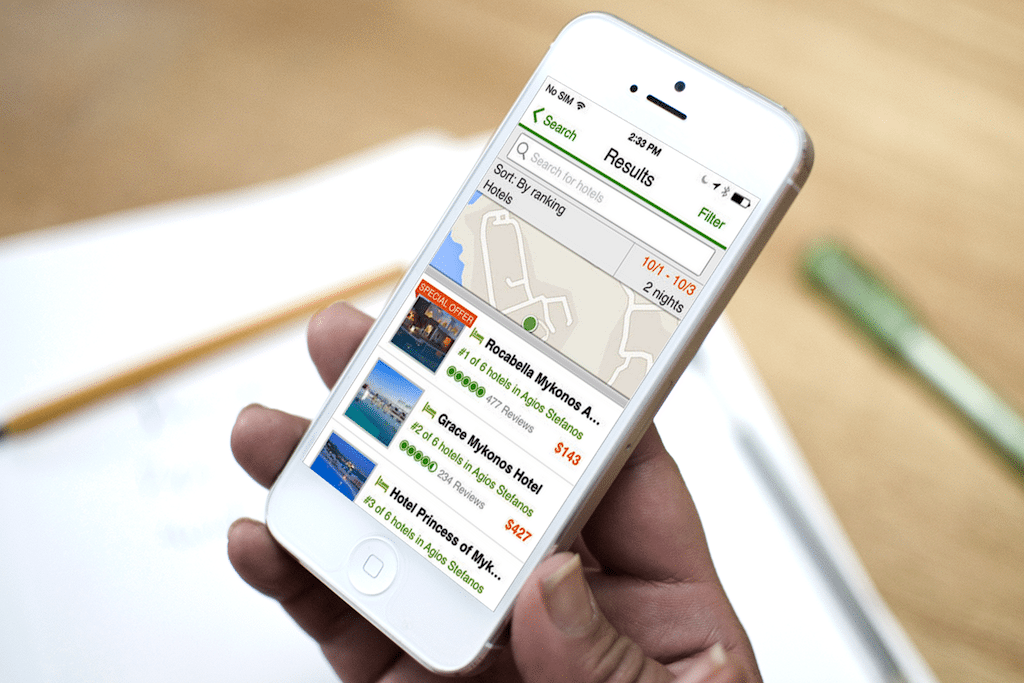Skift Take
TripAdvisor is finding out that transitioning to hotel metasearch is very heavy lifting, and quite a gamble.
Seeking to minimize traveler pain and its own hurt, TripAdvisor announced that it would begin to take direct bookings for hotels through its mobile apps for the first time in 2014, although it doesn’t intend to become an online travel agency.
CEO Stephen Kaufer, speaking during the company’s third quarter earnings call October 23, called mobile bookings the current “pain point” because travelers using TripAdvisor smartphone apps for hotel metasearch must navigate to an online travel agency or hotel site to complete a booking, and then they get frustrated if they want to return to the app to check another hotel rate.
“You are kind of lost a bit,” Kaufer said of the user experience. “When we watch our users, they struggle to get back to TripAdvisor.”
He said a key reason that TripAdvisor’s hotel comparison product isn’t monetizing as well as it could on mobile is because users are having trouble opening the app again, and then the next time to navigate directly to the hotel or OTA site instead.
Kaufer said users don’t experience the same problems using TripAdvisor hotel metasearch, which was rolled out completely in early June, on desktops or tablets, and so he wouldn’t say whether direct booking will eventually be expanded beyond TripAdvisor’s smartphone apps.
With the change, Kaufer said, TripAdvisor doesn’t intend to become an online travel agency — in other words, it wouldn’t become the merchant of record — but would facilitate the booking.
If TripAdvisor carries out direct bookings the way competitors such as Kayak, Room77 and Hipmunk have done, the company will partner with an online travel agency such as Expedia, which will actually process the bookings and handle customer service in the background.
Mobile is key for TripAdvisor as it now accounts for an average of 108 million monthly unique users, nearly 40% of all traffic, Kaufer said.
And, CFO Julie Bradley said mobile revenue now makes nearly 15% of total revenue
‘Choppy’ Pricing For Hotel Metasearch
The backdrop to the whole discussion was that Kaufer revealed that mastering metasearch has been tougher than anticipated, in his words pricing has been “choppy.”
And, that led to an interesting discourse on the way TripAdvisor made its money from hotels and OTAs under its prior pop-under ad system versus hotel metasearch today.
Asked whether advertisers were paying too much previously for pop-unders or aren’t paying enough today in hotel metasearch, Kaufer said previously under the pop-under system, TripAdvisor was sometimes getting credit for bookings that it didn’t necessarily deserve, and under metasearch today it is subject to more “leakage” and perhaps isn’t getting its due.
Under the pop-under scenario, TripAdvisor was sending users to advertisers’ sites to book a hotel, for example, and perhaps would get credit that TripAdvisor didn’t really deserve for a flight booking that took place at a later point, Kaufer said.
With hotel metasearch today, however, TripAdvisor may send a user to an OTA to book a Hilton hotel, and won’t get the credit for a conversion when the user later checks prices again and goes directly to the OTA or hotel site, Kaufer said.
Kaufer said the metasearch experience has more leakage than the pop-under experience, but TripAdvisor is betting that it will be a better user experience, and will trigger more repeat users.
TripAdvisor lowered its full-year 2013 CPC revenue guidance to a mid- to high teens percentage increase, from high- to low-20s, Bradley said. Officials said increased costs for SEO and international growth, plus higher mobile traffic, contribute to the lower guidance.
Have a confidential tip for Skift? Get in touch
Tags: apps, metasearch, tripadvisor
Photo credit: TripAdvisor's iOS app as seen on the iPhone. PlaceIt by Breezi
